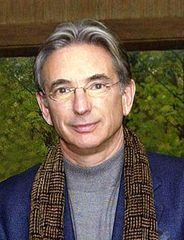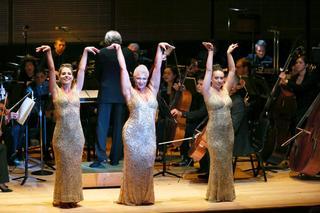|
Back
Premieres For a Gala Evening New York
Zankel Hall, Carnegie Hall
05/02/2019 -
Michael Tilson Thomas: Sunset Soliloquy for solo piano – You Come Here Often? (New York Premieres) – Four Preludes on “Playthings of the Wind”
Franz Schubert: String Quartet in D Minor, D. 810 “Death and The Maiden” (Arranged for string orchestra by the composer, edited by Mr. Thomas)
Meashsa Brueggergosman (Soprano), Kara Dugan, Kristen Toedtman (Vocals), Yuja Wang (Pianist)
New World Symphony Chamber Orchestra and Cabaret Band, Michael Tilson Thomas (Artistic Director/Conductor)

M. Tilson Thomas (© Stefan Cohen)
“I think music needs to be presented in a way so that kids can grasp songs, dances, simple music that's associated with some particular defining moment in human experience.”
Michael Tilson Thomas (1944– )
When a two-hour orchestral concert begins with some solos by Yuja Wang, it augurs a blowout gala evening. This, the second performance this week by Michael Tilson Thomas and his young New World Symphony, made the word “gala” seem like an understatement.
First Yuja Wang, then came the unearthly Canadian soprano Meashsa Brueggergosman, with two other singers in dazzling diamond-flashing gowns, along with a cabaret orchestra, the New World Orchestra and MTT (Mr. Thomas’s name to all who know him) conducting. And finally a work of music encompassing Franz Schubert, Gustav Mahler, MTT, and the strings of the New World Orchestra.
All of it with New York premieres of four Michael Tilson Thomas compositions.
In one way, MTT reflects that other adventurous American conductor, Leonard Bernstein. They are both famed as pianists, composers, explainers, conductors. Their genius extends from Mahler to American classics, their fame extending from America to Europe. Bernstein, though, was a product of Harvard and the East Coast. MTT, born on the West Coast, embraces that outward look, as well as a heritage of classic Russian-Yiddish theater and a messianic spirit for his Miami-based New World Symphony, whose professional musicians and futuristic media works with musicians throughout the world.
And he is also (like Bernstein) a helluva composer, as a full house in Zankel Hall heard last night. The music was retrospective (of his own life), jazzy (Ms. Wang’s second work), a synthesis of “classical” with a history of American music based on (unbelievable!) poems of Carl Sandburg. And finally, not “editing” but a transmutation of Mahler’s own transcription of Schubert’s great string quartet.
Ms. Wang started with one of MTTvs earliest works, later re-composed during the decades. Starting with a long seemingly-improvised left-hand recitative, she added her right hand for a more danceable theme, then putting them together for a memory of a probably euphoric childhood in the Tomashevsky household.
The next work was more showy from a less-than-showy pickup line, You Come Here Often?. Augmented boogie-woogie, terrifically bouncy from a bouncy Yuja Wang, difficult, virtuosic and great great fun. Leonard Bernstein, Oscar Peterson and Fats Waller would all have loved it.
MTT, who explained each work, told of the surprises he had in finding the Carl Sandburg poems for his next piece. This writer had long ago purposely forgotten Sandburg after his hagiographic biographies of Abraham Lincoln. But the shatteringly progressive poems by Sandburg here were like prescient wicked parodies of today’s American xenophobia.
Taking the mantra, “We are the greatest nation, nothing like us ever was”, the poet wrote how now, “the only listeners left now...the rats...and the lizards...and the crows.”
MTT could have composed a moribund Mass for our dead patriotism. Instead, he created a spectacle.

K. Dugan, M. Brueggergosman, K. Toedtman, M. Tilson Thomas
(© Steve J. Sherman)
The words were sung, warbled, scatted, sung as blues, jazz, drama, opera by Ms. Brueggergosman and her two backup vocalists, all dancing, parodying and paying obeisance to American music. MTT used a cabaret band and his own truncated New World Orchestra. together, doing variations of everything from Rockabilly to jazz to a party for everybody on stage.
It was MTT, it was great soloists, and it was also Brechtian, the Brecht whose poetry pictured pre-Nazi Germany. Musically showy, dancey, verbally acerbic.
Part of the audience disappeared in the intermission, missing out on one of MTT’s undoubted triumphs. Schubert’s song Death and The Maiden was the theme for the second movement of his string quartet, then partly written for string orchestra by Gustav Mahler.
With all one’s reverence for Mahler, transcriptions, mainly of Bach, are dull, heavy, Victorian stodgy. I wouldn’t imagine much better for the Schubert.
Nor did Michael Tilson Thomas. His conception was not simply transcription, but to give every consort of his large string ensemble a chance to sing. The violins took up the front row (Mahler style), behind were violas and cello. At times, he allowed a quartet of first-chair players concerto grosso style. Again, he broadened out the whole ensemble, offering double basses the gift of foundation. MTT used no less than seven double basses!!
It sounded at times like the strings were divided into six or eight parts, but rather than bloating, he simply added more depth, more resonance to the original.
One might have remembered the Tchaikovsky or Elgar string orchestra pieces. But MTT was working with one of the greatest chamber works ever created. And just as he never lost sight of American music in his Sandburg piece, his reworking was, in his own original, inimitable way, an homage to Schubert. And the end of an honestly gala event.
Harry Rolnick
|